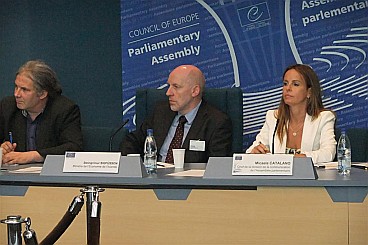Council of Europe: European mania for austerity menace to democratic and social rights
Council of Europe: European mania for austerity menace to democratic and social rights
Countries in Europe would be wise to reconsider their austerity programmes as they are almost completely directed at reducing spending in the social realm. This is threatening to deepen the economic crisis in Europe and undermine the social and democratic human rights of the citizens. So says the Parliamentary Assembly of the Council of Europe, in which forty-seven member states are represented
 SP Senator Tiny Kox, President of the United Left Group in the assembly in Strasbourg, was pleased with the clear language of the statement by Europe’s oldest human rights organisation. ‘Everywhere in Europe the realisation is growing that with nothing but short-sighted austerity we will simply sink deeper into problems and lose any prospect of a social Europe,’ he says. The Left Group took the initiative a year ago in proposing the establishment of an enquiry into the dangers presented to democratic and social rights by the mania for austerity. Since then a clear majority of the 350-strong assembly had given its support to the move to put the austerity programmes in Europe under the microscope and seek alternatives. 'In addition to any necessary reductions in spending we must try to increase the incomes of governments by raising taxes on high incomes and on wealth, combatting tax evasion and introducing new taxes on financial transactions within Europe,’ says Kox. ‘And more than that, as the assembly has just declared, we must look into how we can modernise the democratic structures and involve the people more in decision-making, for example by means of referenda.’
SP Senator Tiny Kox, President of the United Left Group in the assembly in Strasbourg, was pleased with the clear language of the statement by Europe’s oldest human rights organisation. ‘Everywhere in Europe the realisation is growing that with nothing but short-sighted austerity we will simply sink deeper into problems and lose any prospect of a social Europe,’ he says. The Left Group took the initiative a year ago in proposing the establishment of an enquiry into the dangers presented to democratic and social rights by the mania for austerity. Since then a clear majority of the 350-strong assembly had given its support to the move to put the austerity programmes in Europe under the microscope and seek alternatives. 'In addition to any necessary reductions in spending we must try to increase the incomes of governments by raising taxes on high incomes and on wealth, combatting tax evasion and introducing new taxes on financial transactions within Europe,’ says Kox. ‘And more than that, as the assembly has just declared, we must look into how we can modernise the democratic structures and involve the people more in decision-making, for example by means of referenda.’

United Left rapporteur Andrej Hunko (Germany) left, Deputy Prime Minister Steingrimur Sigfusson (Iceland) centre.
It was remarkable to see how, after initially resisting, the centre-right Liberals (ALDE) and Christian Democrats and Conservatives (EPP/CD) in the end supported by a large majority the conclusions and proposals of rapporteur Andrej Hunko (Die Linke [The Left], Germany). Amongst his conclusions was the assertion ‘that the introduction of austerity measures in European countries is linked to institutions the character of which calls into question their democratic legitimacy.’ As a concrete example he gave the troika of European Union, International Monetary Fund and European Central Bank. His call to the Council of Europe to accept his report and thereby to send a strong signal that reconsideration of the present austerity policy is urgently needed won remarkably broad support after a day long debate.
Iceland’s alternative?
During the debate Icelandic Deputy Prime Minister Steingrimur Sigfusson explained how the left government in his country was following another course to escape from the financial-economic crisis. Iceland was the first country to go almost bankrupt in 2008 as a result of the collapse of a financial sector which had come completely off the rails. The right-wing government fell in consequence and a new coalition was formed of social democrats and Sigfusson’s Left Green Party. The Icelandic Deputy Prime Minister will be a guest speaker at Saturday’s SP Congress in Den Bosch.
